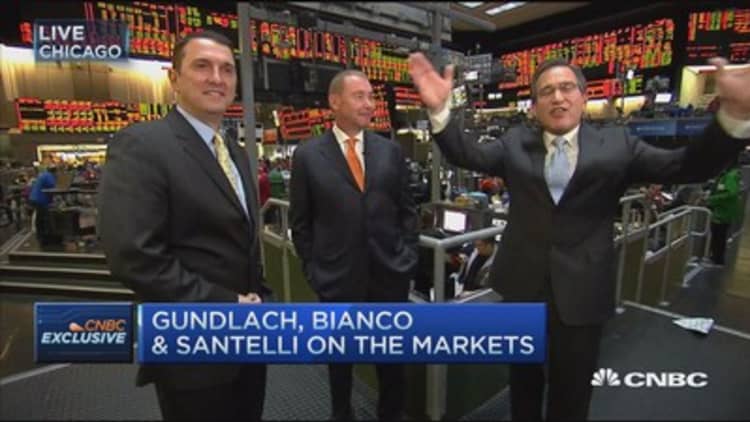
Long-term bonds would benefit from Federal Reserve tightening as stocks continue to climb with help from their "best friend," near-zero interest rates, bond investor Jeffrey Gundlach said Wednesday.
Gundlach, Doubleline Capital's CIO, said he doesn't believe the Fed will raise interest rates this year. Many analysts think one will come in September, but it wasn't too long ago that expectations were for one in June.
"If the Fed doesn't raise rates, that's bad for the long bond because the bond wants it to tighten. And it's positive for stocks because stocks love their friend, zero interest rate policy," Gundlach said on CNBC's "Squawk Alley."
Gundlach said stocks will cheer easy monetary policy if it continues.
In that environment, investors have looked to corporate bonds for high yield, Gundlach said. Long-term high-yield corporate bond funds have seen a "monstrous inflow," he added.
But those bets would face considerable vulnerability if rates rise. He would look away from those if yields climb, as the risk of default would increase.
"There is going to be a very different context for junk bonds than anybody has experienced," he said.
Read MoreHigh yield junk bonds still 'frothy': Blackstone
He noted, though, that the "starvation for yield" has seemed to slow.
Gundlach's advice on corporate junk bonds follows a similar warning from Blackstone Group's head of global private equity Joe Baratta, who on Tuesday called prices on junk bonds "unsustainable."
"Sub-investment grade corporate credit markets are as frothy as they've been," Baratta said at the Wall Street Journal Private Equity Analyst Conference in New York.
However, he noted that the trend was not broadly dangerous to the U.S. economy.
Read More Fed policy helping rich get richer: BlackRock
— CNBC's Lawrence Delevingne contributed to this report


